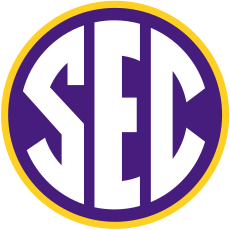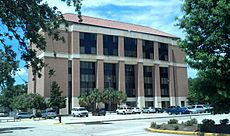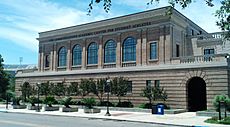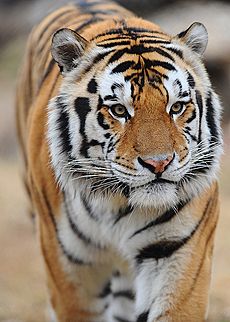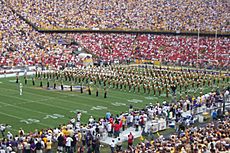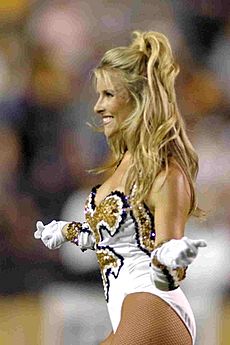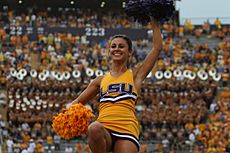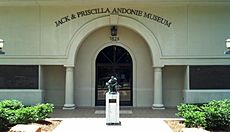LSU Tigers facts for kids
Quick facts for kids LSU Tigers |
|
|---|---|
 |
|
| University | Louisiana State University |
| Conference | Southeastern Conference (primary) CCSA (beach volleyball) |
| NCAA | Division I (FBS) |
| Athletic director | Scott Woodward |
| Location | Baton Rouge, Louisiana |
| Varsity teams | 21 |
| Football stadium | Tiger Stadium |
| Basketball arena | Pete Maravich Assembly Center |
| Baseball stadium | Alex Box Stadium, Skip Bertman Field |
| Softball stadium | Tiger Park |
| Soccer stadium | LSU Soccer Stadium |
| Natatorium | LSU Natatorium |
| Other arenas | Bernie Moore Track Stadium Carl Maddox Field House Highland Road Park LSU Tennis Complex Mango's Beach Volleyball Club University Club of Baton Rouge |
| Mascot | Mike the Tiger |
| Nickname | Fighting Tigers, Tigers, Lady Tigers, Bayou Bengals |
| Fight song | Fight for LSU |
| Colors | Purple and Gold |
The LSU Tigers and Lady Tigers are the sports teams that represent Louisiana State University (LSU). This university is located in Baton Rouge, Louisiana. LSU competes in NCAA Division I, which is the highest level of college sports in the United States. They are part of the Southeastern Conference (SEC). LSU's sports program is known as one of the best in the country, based on how many games they win.
Contents
Team Nicknames
The official nicknames for Louisiana State University's teams are the Fighting Tigers, Tigers, or Lady Tigers. The "Lady Tigers" name used to be for women's teams in sports where both men and women had teams. These included basketball, cross country, golf, swimming, diving, tennis, and track and field. Since 2017, only women's basketball, cross country, and track and field teams use the "Lady Tigers" name.
Sports at LSU
| Men's sports | Women's sports |
|---|---|
| Baseball | Basketball |
| Basketball | Beach volleyball |
| Cross country | Cross country |
| Football | Golf |
| Golf | Gymnastics |
| Swimming and diving | Soccer |
| Tennis | Softball |
| Track and field† | Swimming and diving |
| Tennis | |
| Track and field† | |
| Volleyball | |
| † – Track and field includes both indoor and outdoor | |
LSU has teams in nine men's sports and twelve women's sports. Most of these teams compete in the Southeastern Conference. The women's beach volleyball team competes in the Coastal Collegiate Sports Association.
LSU was the first school in the SEC to win at least 10 conference championships in football, men's basketball, and baseball. They were also the first SEC school to win at least one national championship in each of these three major sports.
As of the 2017 NCAA athletic season, LSU has won 49 national team championships overall. The NCAA recognized 44 of these. The NCAA does not award national championships for college football at the highest level, and it does not recognize LSU's claimed men's basketball championship from 1935.
LSU is tied for ninth place all-time in the number of NCAA Division I national championships.
Club Sports
Besides the main varsity teams, LSU also has many club sports. These teams are run by students and compete against other universities' club teams.
Men's Rugby
The LSU rugby team started in 1970. They play their games at the UREC Field Complex. The team has a history of success, including a 22-game winning streak in 1996-97. They won a national college championship in 1976.
Recently, LSU rugby has done well in their conference, the Southeastern Collegiate Rugby Conference. They also compete in national tournaments. In 2011, they finished 9th in the Collegiate Rugby Championship, which was shown live on NBC.
Men's Soccer
The LSU men's soccer team was founded in 1964. Since 2016, they have played in the Collegiate Soccer League of Louisiana (CSLL). Their home games are at the UREC Field Complex.
In 1998, the team won their only national title in the NIRSA National Open Division.
Men's Volleyball
The LSU men's volleyball team plays in the Southern Intercollegiate Volleyball Association. They compete against other teams in their region for championship honors.
Other Club Sports
| Sport | Association | |
|---|---|---|
| Bowling team | United States Bowling Congress Collegiate Division, Southwest Intercollegiate Bowling Conference | |
| Men's Disc Golf team | 2023 Div II Qualifier Nationals | |
| Women's Disc Golf team | 2023 Div II Qualifier Nationals | |
| Women's equestrian team | ||
| Men's ice hockey team | American Collegiate Hockey Association, South Eastern Collegiate Hockey Conference | |
| Men's lacrosse team | United States Intercollegiate Lacrosse Association, Lone Star Alliance | |
| Women's lacrosse team | Women's Collegiate Lacrosse Associates, Texas Women's Lacrosse League | |
| Powerlifting team | ||
| Rowing team | American Collegiate Rowing Association, Southern Intercollegiate Rowing Association | |
| Women's rugby team | ||
| Triathlon team | ||
| Water polo team |
Championship Wins
LSU has won 50 national team championships. This places them 19th among all schools for total national championships. The NCAA recognized 45 of these wins, ranking LSU 9th overall for NCAA-recognized titles.
- Men's Teams (19)
- Baseball (6): 1991, 1993, 1996, 1997, 2000, 2009
- Boxing (1): 1949
- Golf (5): 1940, 1942, 1947, 1955, 2015
- Indoor Track & Field (2): 2001, 2004
- Outdoor Track & Field (5): 1933, 1989, 1990, 2002, 2021
- Women's Teams (26)
- Basketball (1): 2023
- Indoor Track & Field (11): 1987, 1989, 1991, 1993, 1994, 1995, 1996, 1997, 2002, 2003, 2004
- Outdoor Track & Field (14): 1987, 1988, 1989, 1990, 1991, 1992, 1993, 1994, 1995, 1996, 1997, 2000, 2003, 2008, 2012 (vacated)
Other National Team Championships
These championships were not awarded by the NCAA.
- Men's
- Football (4): 1958, 2003, 2007, 2019
- Basketball (1): 1935
- Rugby (1): 1976
Athletic Facilities
Here are some of the main sports facilities used by the LSU Tigers and Lady Tigers teams. These include outdoor stadiums, indoor arenas, and training areas.
Tiger Stadium
Tiger Stadium is where the LSU football team plays its home games. It is also known as "Death Valley." The stadium first opened in 1924 with 12,000 seats. Today, it can hold 102,321 fans, making it one of the largest stadiums in the world.
Tiger Stadium has some special features. Unlike most football fields, it marks every 5-yard line, not just every 10. It also has "H" style goal posts, which are different from the "Y" shape used by many other schools. This "H" style lets the team run through the goal post in the north end zone. A crossbar from old goalposts (1955-1984) hangs above the locker room door. Players touch it for good luck before running onto the field.
Football Practice Facilities
- Charles McClendon Practice Facility
- This is the practice area for the LSU football team. It includes the LSU Football Operations Center, the Tigers Indoor Practice Facility, and four outdoor practice fields. It was named in 2002 after former LSU coach Charles McClendon.
- LSU Football Operations Center
- Built in 2006 and updated in 2019, this building has everything the football team needs. It includes the locker room, a players' lounge, weight room, and coaches' offices. The main area shows off team trophies and LSU football history. A nutrition center is also being added for the athletes.
- LSU Indoor Practice Facility
- This indoor facility was built in 1991. It is climate-controlled and connected to the Football Operations Center. It has a 100-yard indoor field for practice.
- LSU Outdoor Practice Fields
- There are four outdoor practice fields next to the football operations center. Three fields have natural grass, and one has artificial turf.
Basketball and Volleyball Arena
- Pete Maravich Assembly Center
- Opened in 1972, this arena is home to the men's and women's basketball teams, the gymnastics team, and the indoor volleyball team. It's also called "Deaf Dome" or "PMAC." It can hold 13,215 people. It was renamed in honor of LSU basketball legend Pete Maravich after he passed away in 1988. The volleyball team also practices in a gym located under the arena.
Basketball Practice Facility
- LSU Basketball Practice Facility
- This practice facility, connected to the Maravich Center, was finished in 2010. It has separate, full-size gyms for the men's and women's basketball teams. The courts look exactly like the main game court in the Maravich Center. The building also has locker rooms, a team lounge, and coaches' offices. A large lobby displays LSU Basketball history and trophies.
Baseball Stadium
- Alex Box Stadium, Skip Bertman Field
- This is the home stadium for the LSU Tigers baseball team. It can seat 10,326 fans. The stadium is named after Simeon Alex Box, an LSU athlete who died in World War II. In 2013, the field was named after former LSU baseball coach and athletic director Skip Bertman. The first game in the new stadium was in 2009.
Track and Field Facilities
- Bernie Moore Track Stadium
- This is the outdoor stadium for the LSU Tigers and Lady Tigers track & field teams. Built in 1969, it seats 5,680 people. It was renamed in 1971 after former LSU coach and SEC Commissioner Bernie Moore. He led the Tigers to their first NCAA National Championship in track in 1933. The stadium also has a 2,000 square foot weight room for the track teams.
- Carl Maddox Field House
- This is the indoor stadium for the track & field teams. It was built in 1975 and updated in 2014, with seating for 2,000. In 1998, it was named after former LSU Athletic Director Carl Maddox.
- Highland Road Park
- This park is the home course for the LSU Tigers and Lady Tigers cross country teams.
Other Sport-Specific Facilities
- LSU Beach Volleyball Stadium
- Opened in 2019, this stadium is located on LSU's campus. It has six competition courts with special sand and a cooling system. Before this, the team played at Mango's Beach Club.
- LSU Gymnastics Training Facility
- This is where the LSU Tigers women's gymnastics team practices. The new facility opened in 2016 and offers 38,000 square feet for training.
- LSU Natatorium
- Opened in 1985, this is the home for the LSU Tigers and Lady Tigers swimming and diving teams. It seats 2,200. It has a large 50-meter pool and a diving well with different platforms.
- LSU Soccer Stadium
- This is the home stadium for the LSU Tigers women's soccer team. It has two levels and seats 2,197 fans.
- LSU Tennis Complex
- Completed in 2016, this complex is home to the LSU Tigers and Lady Tigers tennis teams. It has six indoor courts and 12 outdoor courts.
- Tiger Park
- Tiger Park is the home stadium for the LSU Tigers softball team. Built in 2009, it officially seats 1,289 fans. There's also a grassy area where another 1,200 fans can sit.
- University Club of Baton Rouge
- This golf course is home to the LSU Tigers and Lady Tigers golf teams. It's a large, championship-level course.
- Mary and Woody Bilyeu Golf Practice Facility
- This facility is a learning center for the LSU golf teams. It has a clubhouse with meeting rooms, locker rooms, and coaches' offices.
Training and Rehabilitation Facilities
- Martin J. Broussard Center for Athletic Training
- This center is for athletic training and helping athletes recover from injuries. Built in 1998, it's a two-story, 22,000 square foot building next to Tiger Stadium. It has certified athletic trainers and students who help athletes.
- LSU Strength and Conditioning facility
- Also known as the LSU North Stadium weight room, this facility is for strength training and conditioning. Built in 1997, it's 10,000 square feet and has many different machines and equipment for athletes to get stronger and faster.
LSU Cox Communications Academic Center for Student-Athletes
The LSU Cox Communications Academic Center for Student-Athletes is located in the Gym/Armory building. This building opened in 1930 and was fully renovated in 2002 to become the Academic Center.
The center helps student-athletes improve their school skills. This 54,000 square foot center has computer labs, a library, study areas, and classrooms. It also has a career center and an Academic Hall of Fame.
Non-Varsity Athletic Facilities
- Student Recreation Center
- This facility on campus is used for many club sports like basketball, indoor soccer, racquetball, swimming, and volleyball. It has multiple gyms, an indoor climbing area, indoor and outdoor pools, and tennis courts.
- UREC Field Complex
- This complex is used for club sports like flag football, lacrosse, rugby, soccer, and ultimate frisbee. It has eight lighted grass fields and four lighted grass softball fields.
- Planet Ice Skating and Hockey Arena
- The Planet Ice Skating and Hockey Arena in Lafayette, Louisiana is where the LSU men's ice hockey team plays and practices.
LSU Traditions
Mike the Tiger
Mike the Tiger is the official mascot of Louisiana State University. He is both a live tiger and a costumed character. The live Mike the Tiger lives in a special habitat between Tiger Stadium and the Pete Maravich Assembly Center. His home has lush plants, a waterfall, a stream, and rocky areas.
School Colors
LSU's official colors are Royal Purple and Old Gold. There are a few stories about how these colors were chosen. One belief is that purple and gold were first worn by an LSU team in 1893 when the baseball team played against Tulane.
Another story says that before LSU's first football game, the coach and some players bought ribbons for their jerseys. Stores were selling purple, gold, and green ribbons for Mardi Gras. Since the green ribbons hadn't arrived, they bought all the purple and gold ones.
LSU's first school colors were actually white and blue.
"Fight for LSU"
"Fight for LSU" is the university's official fight song. The band plays this song often, especially when the team enters the field, scores a field goal, or gets an extra point.
LSU Tiger Marching Band
The Louisiana State University Tiger Marching Band, also called The Golden Band from Tigerland, is famous for the first four notes of its pregame show. This 325-member marching band plays at all LSU football home games and many other events.
On game days, the band marches from the band hall to Tiger Stadium. They stop at Victory Hill, just outside the stadium. Thousands of fans gather to hear the drums as the band leaves the Greek Theatre. The band plays the "Pregame Salute" and then runs down the hill while playing "Touchdown for LSU." After the game, the band marches back to the band hall, which is unusual for college bands.
One of the most loved traditions is the pregame performance at every home football game. The band starts in the south end zone. The drum major signals the band to take the field. The band marches out to a single bass drum beat, joined by the Golden Girls and color guard. The band then plays the opening of the salute, turning to face all parts of the stadium. The crowd cheers loudly. The music then speeds up and changes to "Touchdown for LSU" as the band moves across the field. Near the end of the song, the band forms the letters "LSU."
In the "LSU" formation, the band plays the "LSU Alma Mater" and the "Star-Spangled Banner." They then play ""Fight for LSU"" while saluting the stadium. After changing formations, they play the second part of "Tiger Rag," which ends with the crowd chanting "T-I-G-E-R-S, TIGERS!" This is followed by the "First Down Cheer," where fans yell "GEAUX! TIGERS!" The band then plays "Touchdown for LSU" again as they march to the north end zone, forming a tunnel for the football team to enter.
The band also plays on first, second, and third downs when LSU is on offense. The "First Down Cheer" uses music from "Tiger Rag." The "Third Down Cheer" is based on the song "Eye of the Tiger." The song "Tiger Bandits" is played when the LSU defense stops the other team. Fans bow to show respect for the defensive play.
Bengal Brass
The Bengal Brass is a group of 60 musicians chosen from the main band. This all-brass group plays at LSU volleyball matches, gymnastics meets, and all men's and women's basketball games in the Pete Maravich Assembly Center. Bengal Brass also travels with the basketball teams for postseason games.
Golden Girls and Colorguard
The LSU Golden Girls are a dance line that performs with the Tiger Band. They were created in 1959. Today, there are 14 to 18 dancers who try out each year. They get college credit for being part of the team.
The LSU Colorguard is a flag-twirling group that started in 1971. Twenty-four to twenty-eight female twirlers are chosen through auditions.
LSU Cheerleaders
The LSU Cheerleaders include both male and female cheerleaders. They perform at LSU football and basketball games. They lead the crowd in cheers. Before home football games, the cheerleaders ride on Mike the Tiger's mobile unit and lead the team onto the field. They are on the sidelines during football games and along the baseline for basketball games. LSU's cheerleaders also compete in national competitions. The 1989 Tiger cheerleaders won the UCA National Championship.
LSU Tiger Girls
The LSU Tiger Girls are a dance line for the LSU men's and women's basketball teams. This all-female squad performs at all home games and other university events. The Tiger Girls also compete against other dance teams in national competitions.
LSU Bat Girls
The LSU Bat Girls help the LSU Baseball program. There are 30 Bat Girls who work in teams of 10 at all home games and postseason games. They help sell programs, get foul balls, retrieve bats and helmets, answer fan questions, and assist with game day events.
Rivalries
Football Rivalries
The LSU Tigers football team has long-standing rivalries with the Ole Miss Rebels and Tulane Green Wave. More recent football rivalries include the Alabama Crimson Tide, Arkansas Razorbacks, Auburn Tigers, Florida Gators, Mississippi State Bulldogs, and Texas A&M Aggies.
LSU Athletic Hall of Fame
The Louisiana State University Athletic Hall of Fame honors people from the sports program who have made a big impact on the university. To be in the Hall of Fame as an athlete, a person must have graduated from college and been nationally recognized for their amazing performance. They also need to have a good reputation for their character. For coaches or administrators, they must have helped LSU Athletics a lot and been recognized nationally for their achievements.
The Jack and Priscilla Andonie Museum on the LSU campus in Baton Rouge, Louisiana is where the LSU Athletic Hall of Fame is located.
Tiger Athletic Foundation
The Tiger Athletic Foundation or TAF is a private, non-profit group that supports Louisiana State University (LSU) and its sports programs. It is the main source of private money for LSU athletics. Money given to TAF helps every athlete and every team at LSU. TAF provides money for scholarships, academic awards, and new or improved sports facilities. TAF also helps fund academic programs that benefit all LSU students.
Athletic Directors
| Name | Years served |
|---|---|
| Russ Cohen | 1928–1931 |
| T.P. "Skipper" Heard | 1931–1954 |
| Jim Corbett | 1954–1967 |
| Harry Rabenhorst | 1967–1968 |
| Carl Maddox | 1968–1978 |
| Paul Dietzel | 1978–1982 |
| Bob Brodhead | 1982–1987 |
| Joe Dean | 1987–2000 |
| Skip Bertman | 2001–2008 |
| Joe Alleva | 2008–2019 |
| Scott Woodward | 2019– |
See also
 In Spanish: LSU Tigers para niños
In Spanish: LSU Tigers para niños
 | Janet Taylor Pickett |
 | Synthia Saint James |
 | Howardena Pindell |
 | Faith Ringgold |


